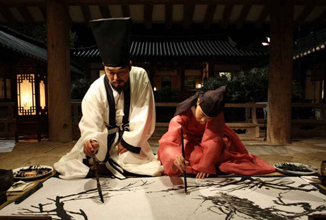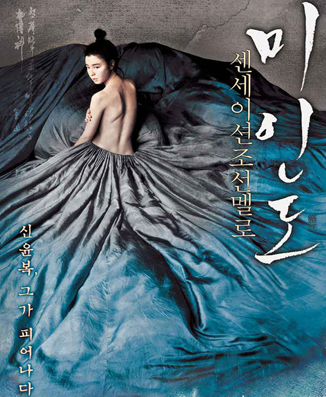"You made vile paintings. Labelling them beautiful won't make them beautiful."
Synopsis:
Yun-jeong is a young girl in 18th Century Korea who has an aptitude for, and a love of, painting, but as women in the Joseon dynasty are not deemed worthy to put brush to paper, she allows her brother to take the credit for her artwork. When her deception leads to her brother's tragic death, Yun-jeong is sent away to study the art of painting in his place, disguised as a man and taking her brother's name in the hope of becoming an artist in the Royal Court.
Her studies progressing over time, Yun-jeong (played in adulthood by Kim Min-sun) gradually blossoms into a beautiful young woman and as she begins to sexually awaken - meeting and falling in love with mirror maker Kang-moo (Kim Nam-gil) in the process - she becomes increasingly obsessed with the sexually explicit interactions taking place all around her. Putting her talent to good use, she starts to create paintings of these graphic scenes but the subsequent discovery of her sexually charged artwork not only threatens her future as a painter, but also ultimately puts her very life in danger...
Review:
What dictates whether visual depictions of sexuality and the sexual act are deemed as art or seen simply as pornography? And who has more of a right to say on which side of the moral line a creative work lays? Is beauty in the eye of the beholder, the moral majority or is the creator of the work the only person who can ultimately say for sure?
Portrait of a Beauty weaves this question within its fictional narrative tale of the life of 18th Century Korean artist Shin Yun-bok, deftly critiquing Korea's Joseon-era society, in the process:
While Shin Yun-bok (known more commonly by his pen name, Hye-won) was, and is still known as, one of Korean's most famous and infamous artists, very little documentation exists today about the man himself, and the mystery and ambiguity of who he really was led author Lee Jeong-myeong to make the supposition that Shin Yun-bok could, in fact, have been a woman disguised as a man, in his novel ‘Painter of the Wind’ - the book on which Portrait of a Beauty is based.
The film takes this idea and runs with it, the ingenious premise allowing director Jeon Yoon-soo to delve beneath the surface of the outwardly pious and moral Joseon society to reveal a far less pure underbelly bubbling over with carnal lusts and desires, and to boldly state that sexuality (though largely deemed immoral in 18th Century Korea and, as such, largely hidden from view and unspoken) traversed the entire class system of historical Korea, nonetheless - all this within a tale of the life, loves and the sexual awakening of a young woman hiding in a man's world.
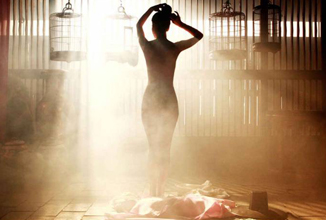 |
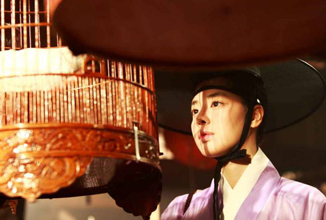 |
At the point in Yun-jeong's life when she is disguised as her late brother and sent to study painting under the tutelage of Hong-do (Kim Yeong-ho), she is still a pure and innocent little girl, unaware of sex and sexuality in any respect, and the fact that she spends her formative years both surrounded by men and, indeed, perceived to be one, allows her to quietly blossom into a young woman without having to learn to deal with the male sexual advances that most other girls of her age would face.
As such, her purity and innocence remain and on finally seeing human sexuality displayed (the naked women by the lake; two women laughing while watching dogs copulating; and even the later theatrical enactment, by two young women, of positions from the Karma Sutra, to give just a couple of examples) she relates it the only thing she understands - love. Not having been indoctrinated into believing that nudity and overt expressions of sexuality are dirty or even immoral, she views them as the most natural thing in the world - the physical expression of love between a man and woman, rather than debased individuals seduced by carnal lust. Her paintings are, from her perspective, a celebration of the human form and of the beauty inherent to emotional physicality, and the possibility of anyone viewing her artwork as sordid or disgusting is utterly beyond her comprehension.
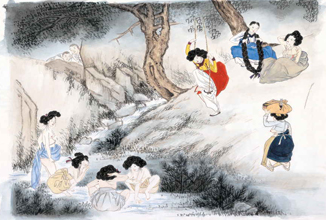 |
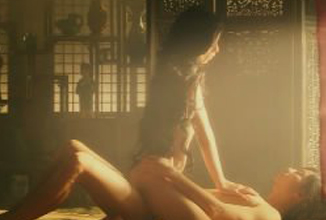 |
Throughout Portrait of a Beauty, Yun-jeong's perspective on the beauty and purity of human sexuality is starkly contrasted with the moral ideals extolled by the patriarchal Joseon ruling class. Though outwardly claiming to be the bastions of all that is pure and wholesome - utterly denouncing any overt sexuality whatsoever - these moral guardians have far baser instincts running through their veins, nonetheless, and their vocal abhorrence of Yun-jeong's paintings not only screams of hypocrisy but also of a desire to be perceived as pure above all else, even if they are, in reality, nothing of the sort.
It could also be said that their turning of sexuality into a taboo subject actually adds to its perceived sordidness and perhaps even results in them having an ultimately twisted notion of what purity really is.
There is a small scene that comes just before Yun-jeong and Kang-moo consummate their relationship for the first time. It consists of Yun-jeong wistfully staring at a bird in a cage and then allowing the bird to escape, quietly stating “Now you’re free”. Whether that caged bird stands for Yun-jeong herself, caged and trapped in a man’s world until her relationship with Kang-moo allows the woman she is to escape; or, instead, stands for the awakened sexuality she’s so desperate to express but has, until now, had to keep hidden from the pious individuals around her, is open to debate but, either way, the analogy stands.
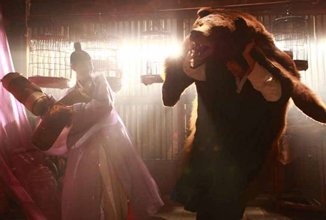 |
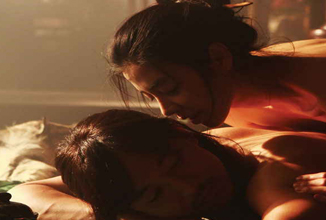 |
It will likely come as no surprise to learn that, with a subject matter such as this, Portrait of a Beauty contains a great deal of nudity and some fairly graphic content. However, this is handled with care and grace throughout, never appearing as simply gratuitous, or titillation for titillation's sake.
Visually, the film is sumptuous and, especially during the sexual scenes, the imagery could easily be described as a sensual artwork - beautifully fitting with the narrative themes surrounding Yun-jeong's paintings, love and life.
In terms of the plot, it does have to be said that in the latter stages of the film Portrait of a Beauty begins to move towards standard romantic melodrama mode, and while this is fairly standard practice in Korean films detailing stories of love and loss (and is therefore rather expected), it does, at least temporarily, somewhat detract from the depth of themes and their nuanced realisation detailed in the earlier stages.
Cast:
The cast of Portrait of a Beauty perform admirably, to the extent that very little criticism could legitimately be made against any of them.
However, Kim Min-sun (as Yun-jeong) is by far the stand out performer and easily provides the most memorable role. The chemistry between her and Kim Nam-gil (as Kang-moo) is not only noticeable but also sensual throughout and combines with the gentle, nuanced direction to majorly heighten viewer empathy.
Note should also be made of the bravery of Kim Min-sun in performing a role in which nudity features so heavily. While no full frontal imagery is present, the fact that the visuals leave little to the imagination on a number of occasions makes the confidence with which gives her performance all the more remarkable
Main Cast:
Kim Min-sun, Kim Yeong-ho, Kim Nam-gil
Director: Jeon Yoon-soo
Summary:
Sexually explicit in both narrative content and imagery, Portrait of a Beauty asks what dictates whether visual depictions of the sexual act are deemed as art or seen simply as pornography, deftly critiquing Joseon-era Korea, in the process.
|


